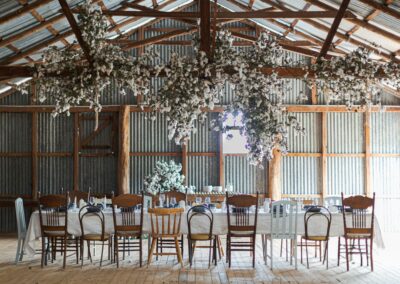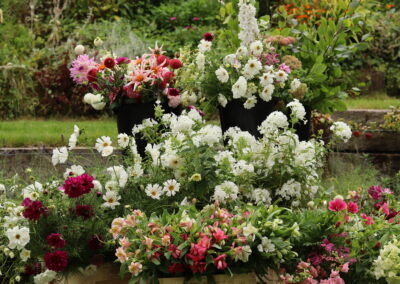A sustainable supply chain for a wedding business is built on three pillars: environmental, social, and economic integrity. It’s not just about what you buy, but also where it comes from, how it was made, and who was involved in its creation. This level of diligence ensures your business can confidently stand by its ethical and sustainable claims. It’s also about resilience – a sustainable supply chain is often more robust, as it relies on local networks and diverse, ethical sources rather than volatile global markets.
Vetting Your Suppliers: A Practical Approach
The most powerful way to make your supply chain sustainable is to actively vet your suppliers. This means moving beyond price and availability to ask probing questions about their practices. A simple checklist or audit is the best way to make this process systematic.
Here are the key questions to ask, tailored specifically for wedding businesses, along with the reasoning behind each one.
Environmental Impact Questions
These questions focus on a supplier’s impact on the planet.
- Carbon Footprint: “Do you measure and report on your carbon footprint? What actions are you taking to reduce it?” A supplier that measures its carbon emissions is one that is taking the issue seriously. Look for data on their Scope 1, 2, and 3 emissions.
- Energy & Waste: “What is your energy source? Do you use renewable energy? What are your waste reduction and recycling policies?” This is particularly relevant for venues, florists, and caterers. A caterer with a composting program or a venue with solar panels demonstrates a tangible commitment.
- Sourcing & Materials: “Where do you source your materials? Are they local and seasonal?” For florists, this means asking about the origin of their flowers and whether they avoid air miles. For stationers, it means asking about recycled paper and vegetable-based inks.
- Packaging: “What is your packaging policy? Is it minimal, reusable, or recyclable?” A photographer using reusable packaging for client prints or a baker using compostable cake boxes shows a dedication to reducing waste throughout the entire product lifecycle.
Social Impact Questions
These questions focus on a supplier’s impact on people and communities.
- Ethical Labour: “How do you ensure fair wages and good working conditions for your employees and those in your supply chain?” This is vital for businesses that rely on complex supply chains, such as those that import wedding clothing, jewellery, or decor. Ask about third-party certifications like Fair Trade.
- Community Engagement: “How do you support your local community?” A supplier that sources from local artisans, donates to a local charity, or participates in community projects is building a positive social impact.
- Diversity & Inclusion: “What is your policy on diversity and inclusion?” A truly sustainable business is one that is inclusive and provides a welcoming environment for all employees, clients, and suppliers.
Economic Impact Questions
These questions focus on how a supplier’s practices contribute to a more resilient, ethical economy.
- Supporting Local: “Are you a local or regional company?” Sourcing locally not only reduces transport emissions but also supports the local economy and builds a stronger community. It also makes your supply chain more resilient to global disruptions.
- Collaboration: “Do you collaborate with other local, sustainable businesses?” A supplier that works with other like-minded businesses is contributing to a sustainable ecosystem and creating a network of trusted, ethical partners.
Taking Action: Beyond the Checklist
Having a checklist is a great start, but it’s just the first step. To truly develop a sustainable supply chain, you need to embed these principles into your business operations.
- Make it a Policy: Formalise your commitment by creating a Sustainable Procurement Policy for your business. This internal policy will serve as a guide for all purchasing and leasing decisions, ensuring consistency and accountability.
- Build Relationships: Go beyond a single transaction. Build strong, long-term relationships with your sustainable suppliers. This fosters mutual trust, encourages shared learning, and can lead to more innovative, sustainable solutions over time.
- Be Transparent: Once you’ve done the work, be open and honest with your couples about your supply chain choices. Share your stories of working with local artisans, ethical florists, or carbon neutral venues. This transparency builds trust and empowers couples to make conscious choices for their own wedding.
- Push for Information: Don’t be afraid to push for information. If a supplier’s website is vague, send a polite but direct email asking for details. The more businesses that ask these questions, the more suppliers will be compelled to become more transparent and sustainable. If a supplier can’t or won’t provide the information, they may not be the right fit for your sustainable business
Developing a sustainable supply chain is no longer a niche concern for the wedding industry; it is a strategic imperative. It moves a business from simply offering “green options” to being genuinely, and verifiably, sustainable from the ground up.
While the initial challenges of cost and complexity may seem daunting, the long-term benefits – from reduced costs and increased innovation to a bolstered reputation and competitive advantage – far outweigh them. By adopting a systematic approach to vetting your suppliers, building strong relationships, and demanding transparency, you are not only safeguarding your own business but also contributing to a more resilient and ethical wedding industry for generations to come. Your every purchasing decision, no matter how small, has the power to create a ripple effect of positive change, making your commitment to sustainability a tangible reality.


